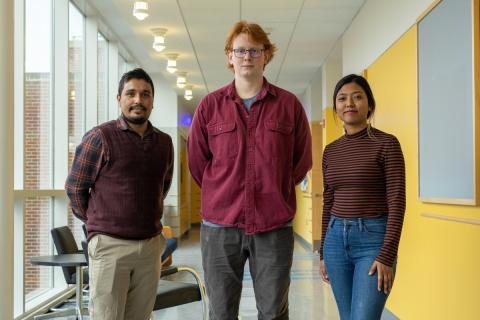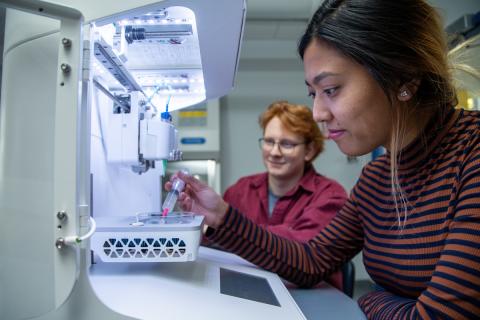With support from both the National Science Foundation’s Established Program to Stimulate Competitive Research (EPSCoR) and the National Institutes of Health’s IDeA Network of Biomedical Research Excellence (INBRE) programs, undergraduate students at Keene State College are gaining valuable research opportunities not typically available to students at this Primarily Undergraduate Institution (PUI).

Students have developed core competencies in mathematics, Computer Aided Design, biomaterials research, and scientific writing, and are making noteworthy contributions to the field of tissue engineering. Their contributions will support the foundation of many regenerative medicine advances on the horizon, such as 3D printed organ transplants.
Undergraduate students Slesha Tuladhar, Carter Nelson, Connor Quigley, and Amar Abbatiello are research assistants of Dr. Md. Ahasan Habib in the Additive Biomanufacturing Lab at Keene State College. Students are testing materials to determine which are easily printable, favorable to living cells, and structurally supportive in larger scaffolds or organ tissues. They are also testing cell cultures. These students have become lead authors of peer-reviewed journal articles and conference proceedings, and presented their results at scientific conferences and to graduate students and faculty members at the University of New Hampshire and Dartmouth College.

Because these students are part of the tissue engineering research thrust of the New Hampshire Center for Multiscale Modeling and Manufacturing of Biomaterials (NH BioMade), they’ve gained insights into a large, statewide, collaborative, and multidisciplinary research program; have had professional development opportunities; and are working alongside the research faculty and graduate students at both UNH and Dartmouth. They are well positioned for either graduate school or career opportunities in New Hampshire’s emerging biomaterials industry.
The Keene State College students are also spotlighted in this article, Cutting-edge biomaterials research part of undergraduate experience at KSC.
This research was partially supported by an award to the New Hampshire Center for Multiscale Modeling and Manufacturing of Biomaterials (NH BioMade), an NSF EPSCoR Research Infrastructure Improvement Track-1 project (#1757371).
